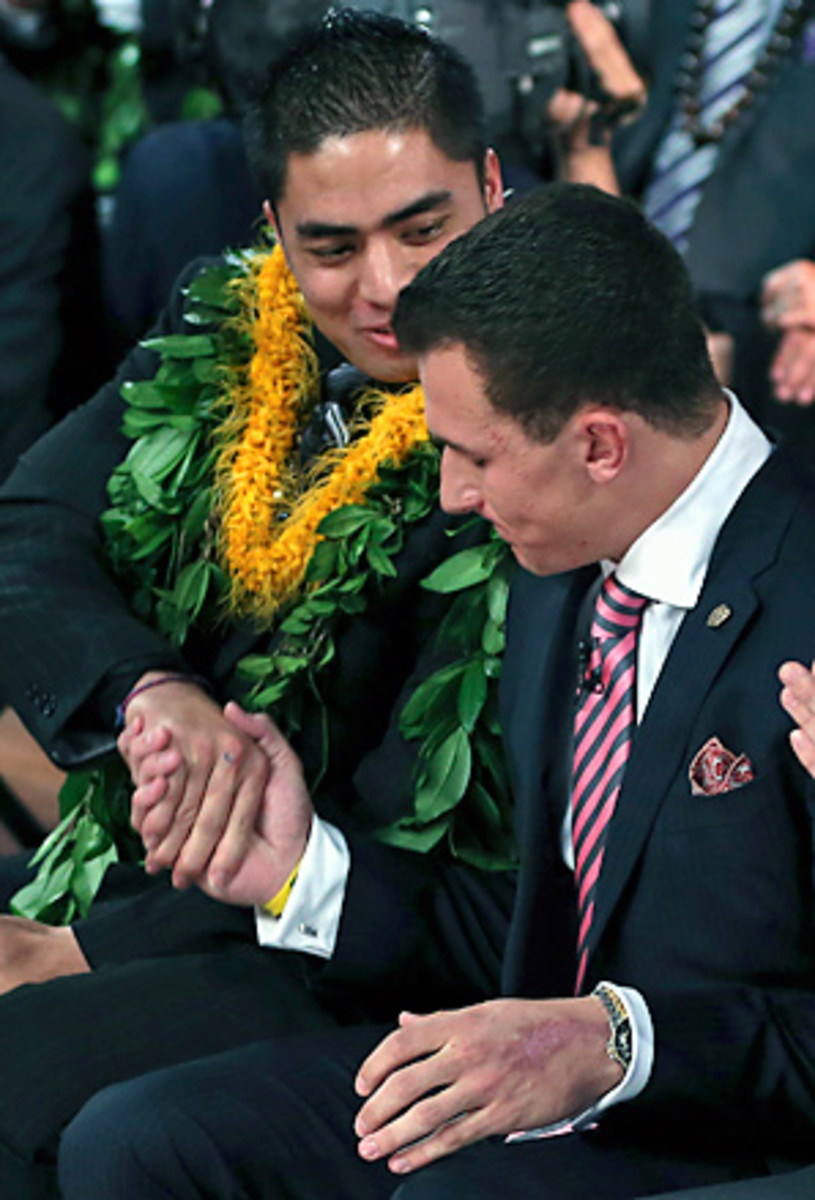
Te'o's runner-up campaign should provide hope to defensive players
NEW YORK -- Sitting among two-dozen reporters in the vast ballroom of the Marriott Marquis hotel, Manti Te'o hardly looked menacing. Around his neck, Notre Dame's senior linebacker wore a colorful assortment of Hawaiian leis, gifts given to him by his aunt earlier in the week as a sign of affection. Looking little like the star who played such a huge role for the Irish's vaunted defense, Te'o spoke of his family who sat more than 5,000 miles away in his hometown of Laie, Hawaii, a group who would watch as he attempted to become the first exclusively defensive player to win the Heisman Trophy.
"Win or lose," Te'o said, "I hope I represent them as best as I can."
In the end, after Texas A&M's Johnny Manziel became the first freshman to win the Heisman, Te'o represented more than just his family. His Heisman campaign signified hope for all defensive players in the future of the award, a prize that for so long seemed out of reach for an athlete who played strictly defense.
STAPLES: Manziel joins most prestigious fraternity
If the 2012 college football season has proven anything, it's that the unwritten rules that have long defined the Heisman Trophy are, one by one, demanding revision. Manziel's Heisman will be remembered as the first for a freshman, and the win came despite a pocket of voters so steeped in tradition they refused to include a freshman on their ballots. Still, the Aggies' quarterback managed to appear on 92 percent of the award's 928 ballots (Robert Griffin III, the 2011 Heisman winner, was named on 80 percent of that year's ballots).
But as with most winners, what Manziel had on his side was his status as an offensive player. In all, 72 of the 77 players to claim the award have been either a quarterback or a running back. On the other hand, only 23 defensive players -- including Te'o -- have ever finished in the top five of voting, and it's entirely possible that Heisman historians will look back at Te'o's campaign as the turning point in regards to the respect given to defensive players. Manziel declared in reference to his freshman stigma, "There is no barrier anymore." That barrier may still exist for defensive players, but as Te'o' showed on Saturday, that once-daunting obstacle is looking more and more surmountable.
Te'o's Heisman finish was a first in many respects even though he fell short of the trophy. His 1,706 total points were the most by a purely defensive player in the award's history (the only defensive player ever to win, Michigan cornerback Charles Woodson in 1997, played snaps at wide receiver and punt returner for the Wolverines). Moreover, Te'o's 321 first-place votes were the most by any runner-up -- offense or defense -- and he became just the sixth defensive player to finish in the top two. Notre Dame's climb to No. 1 in the BCS standings also helped elevate Te'o to a level of prominence historically necessary for defensive Heisman contenders.
The implication was clear: For one reason or another, voters showed little hesitation when casting their ballots for an exclusively defensive player, and that meant long-standing Heisman history was altered before our eyes.
A Heisman race with many firsts for defensive players extended past Te'o's finish. In this year's results, two SEC defensive stars -- South Carolina defensive end Jadeveon Clowney and Georgia linebacker Jarvis Jones -- finished among the top 10 in voting. Clowney garnered 61 total points and four first-place votes for a sixth-place finish, while Jones brought in 41 points, one first-place vote and a 10th-place finish. It marked the first time since 1992 that three defensive players finished in the top 10. In a season with offensive talents like Manziel, Kansas State's Collin Klein and West Virginia's Geno Smith, the turnout of defensive players was a sign that voters looked elsewhere for worthwhile candidates.
But how does this affect the future of the Heisman? Fans of defensive football might not have to wait long for the next threat to the offensive dominance of the award. Clowney's sixth-place finish came on the heels of only his sophomore season in which he finished second in the nation in sacks. With Te'o graduating and Manziel's Heisman glory in the books, the Gamecocks' pass-rusher could be one of the favorites to take home the award in 2013 as the returning anchor of South Carolina's defense. After this year's results, would anyone bet the house against it?
Offensive players in Heisman contention need to take note: This is not your father's Heisman Trophy. These are not your father's Heisman voters. Waves of change are gradually swallowing the award's atmosphere, a change that started with Tim Tebow's 2007 Heisman win as the first sophomore and continued with Manziel's historic victory on Saturday. Te'o's campaign opened the door wider than it's ever been for true defensive contenders, and at this point, it's not a matter of "if" the barrier will be broken. It's "when."





